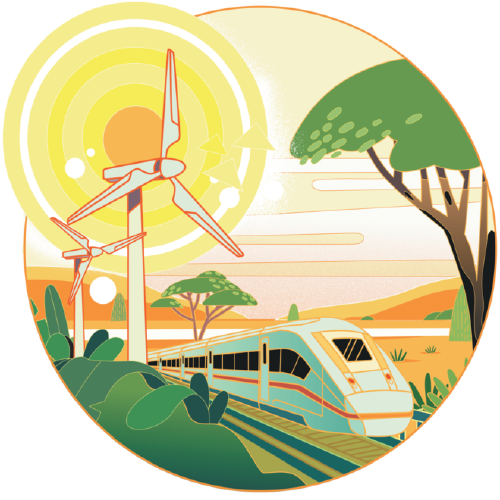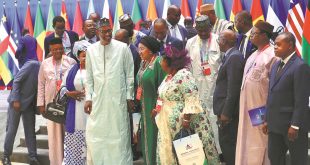Published: January 12,2023
By GU JING
Africa’s development in an era of unprecedented technological transformation and competition

SHI YU/CHINA DAILY
The COVID-19 pandemic is still spreading, and the global economy is in recession. As a consequence, the 2030 Sustainable Development Goals are delayed and difficult to make progress. Global development is at a turning point. We need to recognize there are differences and competition while still promoting development cooperation. The US-Africa Leaders Summit has demonstrated the interconnectedness of the world, as well as the interconnection between global challenges. The African development landscape has undergone significant change in the past decade. The emergence of countries, such as China, India and Brazil, have given rise to crucial alterations in the relationships, approaches and financing modalities of development cooperation, with concomitant implications for African development policy and practice.
China has become the major force for African development in recent years. China’s size and strategic importance mean that its growth and growing influence, through initiatives such as the Global Development Initiative and the Belt and Road Initiative, have become increasingly critical for global development. This is especially the case in the context of Africa, where China’s actions and investments, alone and in cooperation with other countries including the United States, will have a major influence on capacities to achieve multiple SDGs in a range of low-income countries in Africa.
China-Africa economic relations have evolved enormously over the past five decades. China has been Africa’s largest trading partner for 13 years. Trade between China and Africa has grown 20-fold in the past two decades and reached more than $254 billion in 2021. Total Chinese direct investment in Africa was $3.74 billion in 2021. China is the fourth-biggest investor in the African continent. Chinese financiers signed 1,141 loan commitments worth $153 billion with African governments and state-owned enterprises between 2000 and 2019. The turnover of Chinese enterprises’ contracted projects in Africa amounted to $38.3 billion in 2020. China has established 25 economic and trade cooperation zones in 16 African countries and has continued to invest heavily across the continent throughout the COVID-19 pandemic. These economic and trade zones had attracted 623 businesses with a total investment of over $7.35 billion at the end of 2020. Since its founding in 2000, the Forum on China-Africa Cooperation has evolved into an institutionally grounded, multi-track process shaped by heads-of-state summits as a comprehensive strategic partnership.
Amid the pandemic, African countries are experiencing rapid urbanization, and there is a need to ensure that this process is well managed, and underpinned by strong public policy and social governance, to support economic development and social welfare. China and the US have much to share from their respective experience of development and putting in place structures to support population health and welfare.
The prospect that economic transformation in Africa will be of sufficient magnitude and character to absorb the massive increase in Africa’s labor force in the coming decades is perhaps the single most dramatic question of the 21st century. It ranks alongside and will interact with climate change. By 2050, the population of Western Africa will exceed the population of Europe. And associated risks for security and identity are already playing out in European politics. Interaction between cities and regions in Africa via investment in connectivity infrastructure as one of the cores of FOCAC action plans should be part of a dynamic African transformation process.
China’s engagement in Africa, drawing on its own development experiences and the capacities created in that process, holds the promise of helping Africa move onto a transformation path that captures its demographic dividend via rural development and urbanization dynamics, and regional and global integration. China’s vision of a reshaped world economy based on new connectivities, technologies and networks of peoples, within a cooperative global governance system, is injecting fresh ambition and hopes for Africa in the context of heightened geopolitical competition, identity politics, and crisis-prone geo-economic fault lines. Night-time satellite images reveal how Chinese aid projects have contributed to connecting isolated communities through the construction of roads, energy, and digital capacities and networks in Africa and elsewhere. This provides a timely injection of confidence that China’s development cooperation priorities and methods are having an impact on poverty reduction and inequality.
At the same time, African agency in shaping its own development process at the national, regional, and continental levels will be crucial to ensuring that Chinese development finance yields inclusive and sustainable development and helps to build public management capacities and integrity.
The creation of joint approaches and systemic processes at the policy and operational levels will be essential. This may be the opportunity to bring a shared trilateral platform into being, under the African Union umbrella and supported by the African Development Bank and the UN Economic Commission for Africa.
Africa’s sustainable development requires a stronger policy agenda and greater cohesion. A new diplomacy is required that recognizes the inherent complexity of issues and the changed realities of sustainable development governance. Moreover, world leaders must realize that the interconnections of the world and of global challenges require effective leadership to tackle climate change and other crises.
The US-China relationship is the defining geopolitical contest of the 21st century. The US-China relationship will play a defining role in tackling these shared challenges. Whether or not the US and China can cooperate with each other is key to tackling the shared crises. Their cooperation will directly influence the lives of billions of people. With shared crises and agendas, geopolitical contests between states should be oriented by common goals and mutual benefits, and limited to healthy competition and stable tension. The US and China have to find effective ways to establish common interests and thereby resolve the issues, above all, of climate change, but also large-scale development projects in Africa and a multilateral pandemic response in the development context.
The author is a senior research fellow and the director of the Centre for Rising Powers and Global Development at the Institute of Development Studies in the United Kingdom.
 Africa -China Review Africa -China Cooperation and Transformation
Africa -China Review Africa -China Cooperation and Transformation
